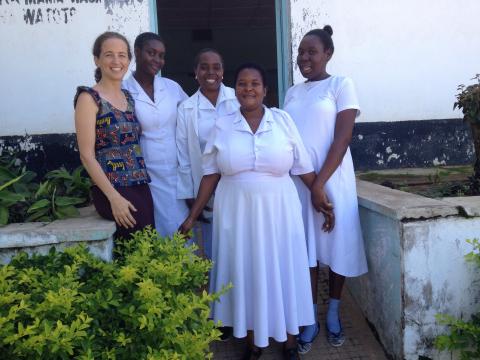
Dr. Anne Berry, a Maryknoll Lay Missioner in Tanzania, reflects on the beauty in Tanzania of extending compassion and care beyond typical American cultural norms.
I listened as Mama Catherine, the experienced and capable operating room nurse, discussed cancer of the cervix with our next client. She explained to the middle-aged woman sitting in a wooden chair in our small cervical cancer screening room that she should remove her underclothes, spread her kanga cloth on the exam table, and lie down when she was ready to begin the simple screening procedure. The woman nodded.
Then Mama Catherine, filling in the register book, asked, “How many times have you given birth?” The woman answered quietly, “Never, I have no children.” Her eyes filled with tears.
Mama Catherine looked up from her data entry. “How can you say you have no children? Don’t your neighbors’ children play at your house?” “Yes,” said the woman. “If they need something, won’t you help them?” “Yes,” said the woman. “If you ask them to run and fetch things, don’t they do it for you?” “Yes,” she answered again. “Then,” said Mama Catherine with an encouraging smile, “You do have children – they are all your children!”
Today’s reading from 1st Corinthians always invigorated me regarding diversity of gifts, but now after living and working in Tanzania for two years, what stands out to me is the call to belonging:
If a foot should say,
Because I am not a hand I do not belong to the body,
it does not for this reason belong any less to the body.
Or if an ear should say,
Because I am not an eye I do not belong to the body,
it does not for this reason belong any less to the body.
In my short time in Tanzania, I’ve met many people who are caring for or supporting extended family members – paying school fees for a niece, raising a grandchild, nursing a cousin back to health, caring for an aging grandparent. Of course, I know people back in the U.S. who do the same, but here it seems not like a special kindness, but the usual, expected thing, because you and your relatives belong to one another.
I remember at the beginning of my Swahili studies learning the words for family members: mother, mama; father, baba; grandmother, bibi; grandfather, babu; sister, dada; brother, kaka. “And what,” I asked our teacher, “is the word for niece, the children of my sister?” “Oh,” answered Mwalimu Magdalena, “they are watoto wako, they are your children!”
I cannot claim to understand the full meaning of familial relationships and obligations in the ethnic groups and cultures of Tanzania, but my Swahili teacher’s pronouncement of belonging between me and my nieces reminded me of Jesus’ pronouncements of new family relationships, like that in Mark 3:34-35, when, “looking at those who sat around him, he said, ‘Here are my mother and my brothers! Whoever does the will of God is my brother and sister and mother.’”
Catholic priest and theologian Gerhard Lohfink writes in Jesus of Nazareth, “The new thing that comes with the reign of God is not something purely spiritual…It is the ‘new family’ of those who follow him…[the church] not only demanded justice; it lived justice… it hoped not only for a future life in heaven; it knew that in the common life of the baptized, heaven is already revealed and the precious treasure has already been found.”
As a Maryknoll Lay Missioner, I try to serve those in need, but also to realize my own needs and open my heart to receive in humble gratitude from my “siblings” in the “new family” of the reign of God. Isaiah’s prophecy of “recovery of sight to the blind” that Jesus proclaims fulfilled in today’s Gospel could apply to those of us from Western cultures where the focus is on the individual. We need to recover the vision of the common life Jesus proclaimed, to learn how to depend on one another in love:
The eye cannot say to the hand, I do not need you,
nor again the head to the feet, I do not need you.
What Mama Catherine told our client at the cervical cancer screening program is the truth I want to learn to truly live: All children are our children, and we are all sisters and brothers. As Bishop Desmond Tutu expresses it: “God’s dream is that you and I and all of us will realize that we are family, that we are made for togetherness, for goodness and for compassion.”
Image: Anne Berry (left) and nurse midwives (Maria, Mama Kisawa, Pendo and Neema) at the Reproductive and Child Health Clinic. Photo courtesy of Anne Berry.
